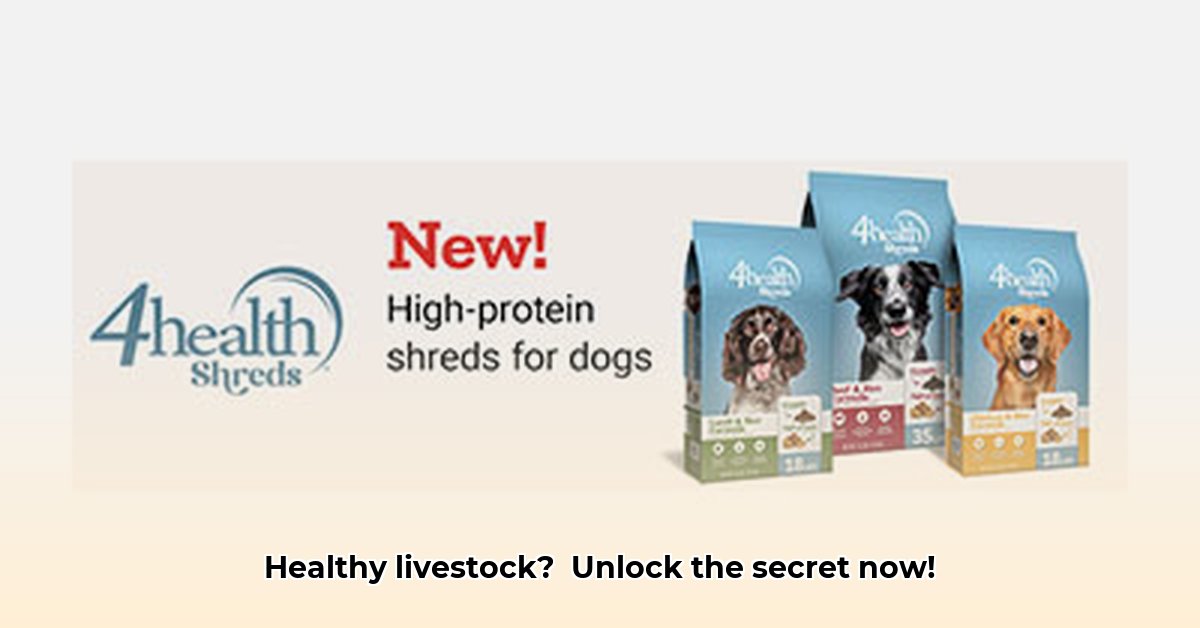
Understanding Selenium's Crucial Role in Livestock Health
Healthy livestock are fundamental to a thriving farm. One often-overlooked factor significantly impacting animal well-being is selenium, an essential mineral often deficient in many grazing areas. Selenium acts as a silent powerhouse, supporting various aspects of animal health, from reproduction and immune function to overall productivity. A deficiency can lead to reduced pregnancy rates, weaker offspring, increased susceptibility to disease, and ultimately, decreased profitability. Are you noticing sluggishness, poor reproduction, or higher-than-normal illness rates in your herd? A selenium deficiency might be the hidden culprit.
For more information on equine supplements, check out this helpful resource: Tractor Supply Equine Supplements.
Isn't it vital to understand the subtle signs of selenium deficiency in your livestock? Many farmers unknowingly face this widespread challenge, especially in regions with selenium-poor soil.
Exploring Selenium Supplementation Options from Tractor Supply and Beyond
Tractor Supply and other agricultural retailers offer a variety of selenium supplements specifically formulated for livestock. These range from convenient free-choice mineral blocks to powders for mixing into feed. While these products provide a practical solution to selenium deficiencies, selecting the right one requires careful consideration of specific needs. The market offers options such as UltraCruz Equine Selenium Supplement or American Stockman SE-90 Trace Mineralized Salt (these are examples; product availability may vary).
Selecting the Right Selenium Supplement: Key Factors to Consider
The ideal selenium supplement isn't a one-size-fits-all solution. Several factors warrant careful consideration:
Animal Species and Age: Different species (cattle, sheep, goats, etc.) and age groups have varying selenium requirements. Young animals, for instance, often have higher needs than mature ones.
Soil Testing: A comprehensive soil test is paramount. This reveals your pasture's selenium content, forming the basis for informed supplementation decisions. Is your soil naturally deficient? This critical data informs your supplement strategy.
Organic vs. Inorganic Selenium: This is a key decision point. Organic selenium (selenomethionine, selenocysteine) is generally more bioavailable (meaning better absorbed), offering better utilization and potentially requiring lower doses. However, it's typically more expensive. Inorganic selenium (sodium selenite, sodium selenate) is more affordable but may have lower bioavailability.
Cost-Effectiveness: While higher-quality supplements might have a higher initial cost, their superior bioavailability can lead to improved animal health and increased productivity, resulting in long-term cost savings.
Your Selenium Supplementation Plan: A Step-by-Step Guide
Implementing a successful selenium supplementation program involves a structured approach:
Conduct a Soil Test: Begin by obtaining a soil test from your local agricultural extension office or a reputable soil testing lab. This provides crucial baseline data on selenium levels.
Consult Your Veterinarian: A veterinarian can assess your herd's health, interpret soil test results, and develop a tailored selenium supplementation plan that aligns with your specific situation and animal needs. "A vet's expert guidance ensures the safety and efficacy of your supplementation strategy," emphasizes Dr. Emily Carter, DVM, from the [Name of Veterinary Clinic or University].
Choose a High-Quality Supplement: Select a high-quality selenium supplement from a trustworthy source like Tractor Supply. Base your decision on your vet's recommendations, the type of selenium (organic or inorganic), cost, and the specific needs of your livestock. Always verify the label for guaranteed selenium content and target species.
Follow Dosage Instructions Precisely: Strictly adhere to the product's instructions regarding dosage and administration methods. Over-supplementation can be toxic to your animals.
Monitor Animal Health: Regularly monitor your herd's health, tracking reproductive rates, weight gain, and overall condition to assess the supplementation's effectiveness. "Consistent monitoring is crucial for optimal results," advises Dr. John Miller, PhD., Animal Nutrition Specialist at [Name of University or Research Institution].
Did you know that consistent monitoring can significantly improve the effectiveness of your selenium supplementation strategy?
Weighing the Pros and Cons: A Balanced Perspective
Selenium supplementation offers numerous benefits but also presents some considerations:
| Feature | Pros | Cons |
|---|---|---|
| Improved Animal Health | Healthier animals; stronger immune systems; enhanced reproductive performance; disease reduction | Potential for selenium toxicity due to over-supplementation; careful adherence to dosage is crucial. |
| Increased Productivity | Higher milk yield; improved weight gain; better fertility; increased overall profitability | Requires ongoing monitoring and management; results may vary based on individual animal factors and soil conditions. |
| Environmental Impact | Potentially reduces reliance on antibiotics; contributes to sustainable livestock farming | Improper disposal of supplement containers can have negative environmental consequences. |
Long-Term Strategies for Sustainable Selenium Management
For sustained success, adopt long-term strategies:
Regular Soil Testing: Conduct regular soil tests to monitor selenium levels and adjust your supplementation accordingly.
Pasture Management: Incorporate pasture rotation to optimize selenium intake if selenium levels vary across pastures.
Integrated Feeding Plan: Develop a consistent mineral and supplemental feeding program that accounts for seasonal changes and the varying selenium needs of your animals at different life stages.
Sustainable livestock management is ongoing. This meticulous attention to detail fosters a thriving, healthy herd year after year.
Key Takeaways:
Selenium is a crucial micronutrient for optimal livestock health and productivity. Deficiencies lead to significant losses in profitability.
Soil testing, veterinary consultation, and careful supplement selection are critical steps in effective selenium supplementation.
Choose a supplement that aligns with your specific needs, species, and financial constraints while considering both organic and inorganic options and their bioavailability.
Consistent monitoring of animal health and adherence to recommended dosage are essential to maximizing benefits and minimizing risks.
Incorporate sustainable practices to reduce environmental impact and promote long-term herd health.
[1]: [Link to a reputable resource on selenium supplementation in livestock, e.g., a university extension website or a peer-reviewed article.]